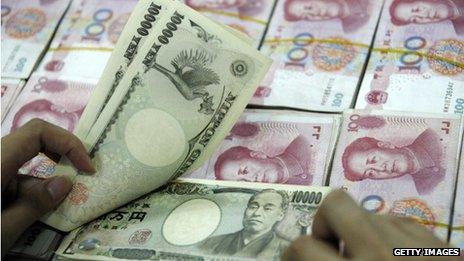A cash crunch in China, the Fed, and Abenomics
- Published
- comments

The morning after the night before: Last night, the Fed suggested the beginning of the end of their cheap cash injections, while the Japanese prime minister confirmed that Abenomics is in full swing.
Then, there's China. Its banks are charging the most on record to lend to each other by one key measure.
It costs 12.3% for banks to lend to each other for seven days. In other words, China is sort-of experiencing a credit crunch, which is fairly surprising as its banks are largely state-owned.
But, they are also suffering the consequences of too much cheap cash, and now there are signs of the beginning of the end of that era.
End date
So, here are some of the connections.
First, the era of cheap cash may now have an end date. The Federal Reserve signalled that it will probably begin to taper its cheap cash injections of $85bn per month by the end of the year.
And if the economy continues to improve along the lines of its forecasts, then this quantitative easing (or QE) programme could end in the middle of next year.
The Fed sees unemployment falling to its target of 6.5% by the end of of 2014. With inflation at a 50-year low of just over 1%, the Fed isn't very constrained at the moment by the other half of its dual mandate of targeting inflation at 2%.
But, this doesn't mean that interest rates will go up very soon. It takes about two years for monetary policy to work its way fully through the economy. Plus, it wouldn't make sense to raise rates while still injecting cheap cash.
So, the Fed members may revise their expectations as to when rates may rise, which is currently in 2015. It is unlikely to be next year.
Women workers
Second, Japan is continuing its cash injection programme, but it is not the Fed in terms of influence. Plus, its firms continue to hoard cash, so not enough is getting out into the economy.
Japan firms' cash stockpile reached a record high in the first three months of the year at 225trn yen. That's about $2.4trn in US dollars, so that's larger than the entire Italian economy's annual output.
Just 55trn yen is held overseas as foreign direct investment. So, for Abenomics to work, these firms need to invest the money and not save the cheap cash on offer.
The Japanese prime minister offered an explanation as to why this is happening.
Abe said, external: "it's possible that Japan's stagnation is essentially men's fault. The period in which men with uniform ways of thinking dominated Japan's business community was too long."
Simply put, women have been under-utilised. Unlike Western European countries, women haven't joined the labour force in sufficient numbers. It boosted their growth in the post-war period.
In Japan, female labour force participation is less than 50% as compared with more than 50% in Western Europe and nearly 70% in China.
When I asked Prime Minister Abe about how much it could boost growth, he said that it could raise GDP by 1%. If that's true, then it could about double Japan's growth rate of the past two decades.
Abe says that this third arrow of Abenomics - the growth strategy - is the most important one, the other two being monetary and fiscal policies. But, it is also likely to be the hardest.
Since 2007 and the global crisis, Japan has lost half a trillion dollars of output, the equivalent of entire Norwegian economy (see my Abenomics article). Thus, there are challenges for Abenomics that means that its success is not yet assured.
Cash spigot
Finally, what does this mean for China and other emerging economies? Again, that the cheap money is leaving. The Indian rupee has hit a fresh record low of 59.9 per US dollar. Markets in the region are continuing their declines.
For China, it is worried about the rapid growth of credit as it is still dealing with the consequences of the unleashing of cash during the last global crisis, which raised concerns about its banks.
So, it is reluctant to turn on the taps even as the latest factory survey (HSBC PMI) out this morning suggests that manufacturing is contracting in June and was the worst reading in nine months.
But, China could turn on the cash spigot again. It is a tough balance of risks.